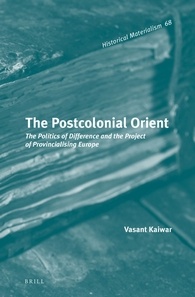Vasant Kaiwar, Duke University
In The Postcolonial Orient, Vasant Kaiwar presents a far-reaching analysis of the political, economic, and ideological cross-currents that have shaped and informed postcolonial studies preceding and following the 1989 moment of world history. The valences of the ‘post’ in postcolonialism are unfolded via some key historical-political postcolonial texts showing, inter alia, that they are replete with elements of Romantic Orientalism and the Oriental Renaissance. Kaiwar mobilises a critical body of classical and contemporary Marxism to demonstrate that far richer understandings of ‘Europe’ not to mention ‘colonialism’, ‘modernity’ and ‘difference’ are possible than with a postcolonialism captive to phenomenological-existentialism and post-structuralism, concluding that a narrative so enriched is indispensable for a transformative non-Eurocentric internationalism.
Biographical note
Readership
Reviews
“The great value of this book lies in Kaiwar’s exceptional ability to historicize both postcolonial studies and our global present. This stimulating book offers an exceptional insight into the postcolonial Orient and Europe alike, showing how a critique of Eurocentrism is not sufficient without considering global capitalism. With theoretical sophistication and political passion, Kaiwar makes a compelling case for the still unrealized potentialities of Marxism and modernities that lie before us.”
– Massimiliano Tomba, Dipartimento di Scienze Politiche, Giuridiche e Studi Internazionali, Università di Padova
“An epic elaboration of Kaiwar’s arresting thesis about the disturbing symmetries between the postcolonial Left and the Orientalist Right. Despite its calm, erudite tone and impeccable scholarship, The Postcolonial Orient bristles with unexpected reversals and revisions. We close its pages uncomfortably persuaded that Samuel Huntington and subaltern studies share the same two-dimensional thinking about an irrational East and a unique West. A seering and eloquent testament that has found its time.”
Timothy Brennan, University of Minnesota
“A landmark achievement. Measured, articulate and incisive, Kaiwar’s book offers both a scorching critique of Subaltern Studies in its ‘postcolonial’ aspect and a triumphant and very contemporary counter-statement of Marxism as an ‘unrenounceable project’ within the universe of capitalist modernity. The central argument gathers bite and traction as the book proceeds. A lucid stylist who wears his erudition gracefully, Kaiwar ranges across the disciplines – political economy, sociology, history, philosophy, literary and cultural studies – in a work whose obvious authority is underpinned as much by its solidaristic collegiality as by the precision of its critical intelligence. This is the kind of book by which readers can reset their compasses.”
Neil Lazarus, University of Warwick
“Vasant Kaiwar’s book is the long overdue Marxist critique of postcolonial and subaltern studies. But, important and successful as this task is, it is not the only one accomplished by the book, which proceeds to reconstruct what could be a Marxist version of subaltern history – as such, Kaiwar’s book is an essential contribution to the revival of Marxist thought.”
Jean-Jacques Lecercle, l’Université Paris Ouest Nanterre La Défense
Table of contents
Preface
1 Introduction
1.1 A narrative of arrival
1.2 1989 and all that
1.3 Postcolonial difference
2 Situating Postcolonial Studies
2.1 Definitions: Colonialism, for example
2.2 Postcolonial modernisation
2.3 Postcolonial populism
2.4 Subaltern Studies
3 Colonialism, Modernity, Postcolonialism
3.1 Colonialism and modernity in a postcolonial framing
3.2 History’s ironic reversals
3.3 Who is the ‘subaltern’ in postcolonial studies?
4 Provincialising Europe or Exoticising India? Towards a Historical and Categorial Critique of Postcolonial Studies
4.1 Marx and difference in Provincialising Europe
4.2 The not-yet of historicism
4.3 Why historicise?
4.4 Tattooed by the exotic
4.5 Under the sign of Heidegger, I: The woman’s question
4.6 Under the sign of Heidegger, II: Imagined communities
4.7 Lack/inadequacy or plenitude/creativity?
4.8 Dominance without hegemony: Historicism by another name?
4.9 The constituent elements of colonial modernity
4.10 Modernity as class struggle
4.11 Orientalism and nativism
4.12 Bahubol and the Muslim question
5 Uses and Abuses of Marx
5.1 Abstract labour, difference, History I and II
5.2 The piano maker and the piano player: Productive and unproductive labour
5.3 Millennial toil as the ‘nightmare of history’
5.4 ‘Bourgeois hegemony’ and colonial rule
5.5 Modernity in the ‘fullest sense’
5.6 Beyond the bourgeois revolution? Hegemony revisited
5.7 The historic moment of colonial dominance in India
5.8 A ‘liberation from blinding bondage’, or the question of historicism
5.9 Marxism and historicism
6 The Postcolonial Orient
6.1 The play of difference, the merchandising of the exotic, tradition and neo-traditionalism
6.2 The non-commissioned officers
6.3 The Orient as ‘vanishing mediator’
6.4 The unrenounceable project
6.5 Provincialising Europe
References
Index

